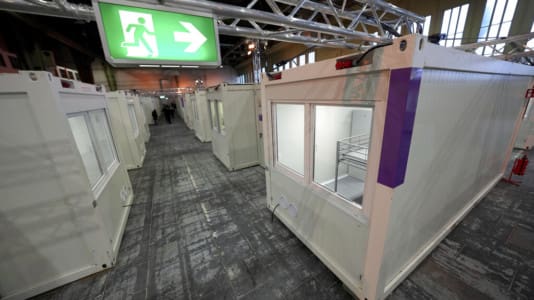While countries in the global north push to import tens of thousands of medical workers from Asia and Africa, there are serious costs to this agenda, which has often left the poorest countries struggling to provide healthcare services.
While immigration is often presented in humanitarian terms, many of the countries losing skilled workers are warning that the West’s immigration policies are leading to a brain drain in their own countries. Doctors and nurses are a huge part of this equation. At the same time, much of the demand for foreign healthcare workers is driven by mass immigration itself, which had led to an explosion in population growth that in turn requires more medical workers. All of these factors are raising additional questions about the moral basis for the West’s immigration agenda.
France is one of the countries looking to liberalize immigration to allow more medical workers from foreign countries the right to live and work in the country, with a particular focus on doctors. Now, medical professors and human rights activists have published a letter entitled, “Let’s not deprive Africa of its doctors.” The article attacks the immigration bill proposed by the French government at the end of December, arguing its push to snap up the qualified health personnel of Africa is not acceptable.
“Here are people who were trained by their country and whom we want to place in France because we lack doctors without asking the question: ‘And their patients, in their country, who will treat them?'” asks Professor André Grimaldi, one of the signatories of the letter.
[pp id=34614]
Grimaldi said that France “cannot, once again, plunder the scientific and intellectual skills of the African continent.” He is calling for the authorities to withdraw the immigration bill.
The new French bill will grant special residence permits to health professionals along with their families, according to Radio France International.
Many unions are criticizing the proposal, arguing that training must be improved in France. They point to the nearly 5,000 foreign doctors practicing in France who do not have the same status and have lower salaries than their French counterparts.
The French government argues it will tighten deportation measure for foreigners, while at the same time promote the arrival of qualified and skilled workers, especially in the healthcare sector. Many of these workers are supposed to, in theory, work in the French countryside and other areas lacking medical professionals.
France is not the only country raising the alarm. In the U.K., doctors are calling for the country to stop poaching doctors from other countries and focus on training their own. Surgeon J Meirion Thomas writes:
In 2021, 63% of new registrants with the General Medical Council qualified abroad. There were 7,377 British graduates, 2,591 from European Economic Area countries and 10,009 international medical graduates, almost all from low-income countries outside Europe.
This is because successive UK governments have realized that it is cheaper to import doctors than to train our own. Medical school places in the UK are strictly limited by cost, to the detriment of thousands of aspiring students.
Between 2016 and 2021, the GMC imported 53,296 doctors from abroad, but no data has been published on their destination. Are they working in the NHS, in the private sector, not working, or have they used their GMC registration to transfer abroad? That audit must be done.
The issue has become so widespread and grave that even the Scientific American called on developed countries to “stop stealing doctors from developing countries,” pointing to the U.S. as one of the main culprits.
Medical degree corruption
While many doctors and nurses in Africa have legitimate medical credentials, it also cannot be denied that Africa features some of the most corrupt countries in the world. In turn, there has been a serious issue with medical degree corruption. This has been seen in a range of countries, including South Africa, in which students trade cash bribes for diplomas and other qualifications. The reality is that many of these schemes go largely undetected. In Liberia, officials claimed one medical school was a “diploma mill,” only for the school operator to turn around and claim the officials threatened to shut down his university if he did not pay them bribes.
In countries such as the U.K., doctors have been found to have been working up to 19 years with fake medical degrees.
[pp id=55635]
The practice of fake doctors carrying degrees from fake medical schools is widespread in Africa, Asia, and the Middle East. While a fake degree may not be enough to gain a visa to Europe, more elaborate schemes have a far better chance of fooling European authorities.
Even in Europe, the issue of cash for medical diplomas exists, particularly in countries such as Ukraine. The country’s universities not only train Ukrainians for the medical profession, but also a wide range of foreign students who earn their degree in the country. Other nations like Romania face a medical system so corrupt that many doctors are choosing to work elsewhere, but that same corruption may follow these workers into their new host countries.
While there are many talented doctors and healthcare workers outside of Europe, the problem for these nations is that more money and a better quality of life can be had in the West. For both the fraudsters and the skilled, the West remains a major draw.
Mass migration creates conditions requiring more doctors
Another factor often overlooked is that mass migration itself creates one of the major conditions that makes it necessary to bring in more doctors and nurses from abroad. The population of France, Germany, the U.K., and just about any other European country would be falling without more immigration. Instead, all of these countries are pushing records for population growth, such as Germany, which just exceeded 84 million people.
While there is no doubt that Europe’s aging population needs more medical care, many of the migrants coming to Europe need higher rates of medical care as well. The sheer numbers of newcomers also mean that Europe’s medical staff are insufficient to treat this arriving population, placing enormous strains on the healthcare system.
[pp id=18433]
As can be seen in the U.K., despite taking in tens of thousands of foreign healthcare workers, emergency rooms are still facing unprecedented overcrowding issues, leading to thousands of deaths. The real issue may not entirely be a lack of foreign healthcare workers, but also an overabundance of foreigners arriving in numbers beyond what the U.K. healthcare and social system can handle.
Although often dismissed as a xenophobic trope, the reality is also that many newcomers bring new diseases. This is not limited to Middle Easterners and Africans either. For example, Ukraine has some of the highest rates of HIV in Europe. With a mass exodus of Ukrainians, Poland, for example, has seen HIV cases jump dramatically. Once again, this places additional burdens on Western Europe’s healthcare system, which once again drives calls for more foreign healthcare workers.
[pp id=7561]
There is additionally a range of unique genetic illnesses among foreign populations that medical staff must acquaint themselves with, such as sickle cell anemia, which is now a major problem in France. European populations already have their own genetic diseases to contend with, but the West’s policy of inviting the world in has also invited an additional layer of complexity into the medical system.
Of course, the language differences and cultural barriers lead to longer wait times as well, not to mention misunderstandings between patients and medical workers. As one article notes, “Healthcare workers in the UK are losing as much as half a working day every week overcoming language barriers. So big is the issue, that people working in UK healthcare admitted that there has been a time during their career that communicating with a patient or colleague with English as a second language has prevented, or delayed them, from giving the best care they could.”
In the end, the West’s solution of simply importing more medical workers and more people may be creating more problems than they solve in the healthcare industry, and that same principle applies for the countries losing many of their skilled medical personnel.






